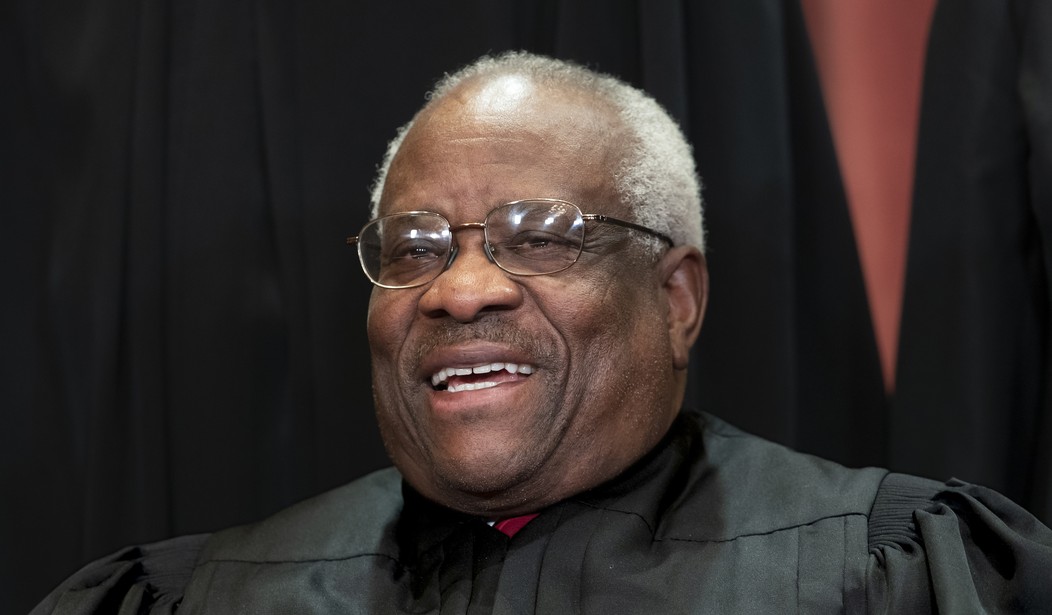In a concurring opinion in Trump v. United States, Supreme Court Justice Clarence Thomas highlighted "another way in which this prosecution" — led by Special Counsel Jack Smith — "may violate our constitutional structure." Specifically, Thomas writes that "the Attorney General purported to appoint a private citizen as Special Counsel to prosecute a former President on behalf of the United States" but he's "not sure that any office for the Special Counsel has been 'established by Law,' as the Constitution requires."
"Few things would threaten our constitutional order more than criminally prosecuting a former President for his official acts," Thomas explains in his concurring opinion. "Fortunately, the Constitution does not permit us to chart such a dangerous course."
Thomas explains that the Constitution requires Congress to create any federal offices "by law" as an "important check against the President" who "cannot create offices at his pleasure." As such, if "there is now law establishing the office that the Special Counsel occupies, then he cannot proceed with this prosecution" because a "private citizen cannot criminally prosecute anyone, let alone a former president."
Noting that "[n]o former President has faced criminal prosecution for his acts while in office in the more than 200 years since the founding of our country...despite numerous past president taking actions that many would argue constitute crimes," Thomas warns that if Special Counsel Smith's "unprecedented prosecution is to proceed, it must be conducted by someone duly authorized to do so by the American people."
Outlining the process by which presidents can appoint individuals as officers of the United States via nominations for someone who must then be confirmed by the U.S. Senate, with limited exceptions for inferior officers authorized by some heads of federal departments. "As relevant here, a 'Hea[d] of Department' — such as the Attorney General — is one such actor that Congress may authorize 'by law' to appoint inferior officers without senatorial confirmation," Thomas explains.
Recommended
However, "[b]efore the President or a Department Head can appoint any officer...the Constitution requires that the underlying office be 'established by Law,'" continues Thomas. "Although the Constitution contemplates that there will be 'other Officers of the United States, whose Appointments are not herein otherwise provided for,' it clearly requires that those offices 'shall be established by Law,'" meaning "an office that Congress creates 'by statute.'"
This check on presidential power, like many others enshrined in the Constitution, comes from abuses of power of the King of England. A brief history lesson from Thomas explains that our "Founders broke from the monarchial model by giving the President the power to fill offices (with the Senate’s approval), but not the power to create offices...by 'imposing the constitutional requirement that new officer positions be ‘established by Law’ rather than through a King-like custom of the head magistrate unilaterally creating new offices.'"
In the past, the federal government has adhered to this constitutional principle, such as when "Congress created an office for a 'special counsel' to investigate the Teapot Dome Scandal and pursue prosecutions," Thomas reminds. "We cannot ignore the importance that the Constitution places on who creates a federal office," he further cautions.
"To guard against tyranny, the Founders required that a federal office be 'established by Law,'" says Thomas. "As James Madison cautioned, '[i]f there is any point in which the separation of the Legislative and Executive powers ought to be maintained with greater caution, it is that which relates to officers and offices.'"
Put succinctly by Thomas: "If Congress has not reached a consensus that a particular office should exist, the Executive lacks the power to create and fill an office of his own accord."
When Attorney General Merrick Garland named Jack Smith as Special Counsel, "he did not identify any statute that clearly creates such an office...[n]or did he rely on a statute granting him the authority to appoint officers as he deems fit, as the heads of some other agencies have," writes Thomas. "Instead, the Attorney General relied upon several statutes of a general nature," none of which "appears to create an office for the Special Counsel, and especially not with the clarity typical of past statutes used for that purpose."
More from Thomas on his questions about the special counsel's legality:
Even if the Special Counsel has a valid office, questions remain as to whether the Attorney General filled that office in compliance with the Appointments Clause. For example, it must be determined whether the Special Counsel is a principal or inferior officer. If the former, his appointment is invalid because the Special Counsel was not nominated by the President and confirmed by the Senate, as principal officers must be... Even if he is an inferior officer, the Attorney General could appoint him without Presidential nomination and senatorial confirmation only if “Congress...by law vest[ed] the Appointment” in the Attorney General as a “Hea[d] of Department.” ... So, the Special Counsel’s appointment is invalid unless a statute created the Special Counsel’s office and gave the Attorney General the power to fill it “by Law.”
The concern about whether the Special Counsel's office was lawfully established "is not a trifling technicality," Thomas writes. "If Congress has not reached a consensus that a particular office should exist, the Executive lacks the power to unilaterally create and then fill that office. Given that the Special Counsel purports to wield the Executive Branch’s power to prosecute, the consequences are weighty," he notes.
"Our Constitution’s separation of powers, including its separation of the powers to create and fill offices, is 'the absolutely central guarantee of a just Government' and the liberty that it secures for us all," Thomas emphasizes. "There is no prosecution that can justify imperiling it."
Quoting from a Scalia dissent in Morrison v. Olson, Thomas says that while "the separation of powers may prevent us from righting every wrong, it does so in order to ensure that we do not lose liberty."
























Join the conversation as a VIP Member